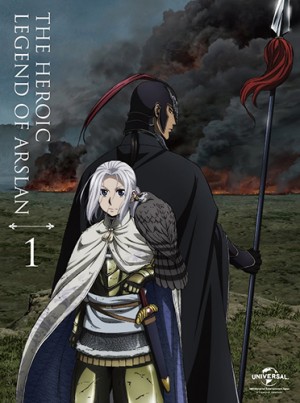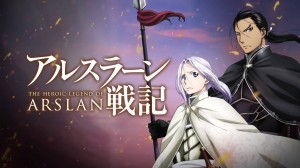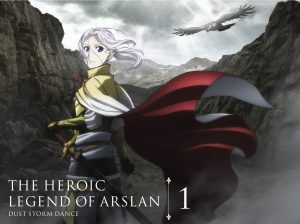
- Episodes : 25
- Genre : Action, Adventure, Drama, Fantasy, Historical,
- Airing Date : Apr 5, 2015 - ongoing
- Producers : FUNimation EntertainmentL
Arslan Senki Preview / Plot (No Spoilers)
Arslan Senki is the story of Prince Arslan, the heir to the Kingdom of Pars, a fictional land that’s very much influenced by Persian history and culture. Pars is caught up in a war with the kingdom of Lusitania, who proselytize their faith violently, attacking other nations to force them to convert to their religion. But Pars too has it’s own evils to worry about, as the institution of slavery is in full force, and slaves seemingly take up a very large percentage of the working population. Lusitania has routed the up till then unbeaten Parsian army, and seized the capital of the country as well as the king, and Arslans father. Arslan himself must gather his forces, key allies, as well as his own strength to fight back both Lusitania, and the elements of Parsian society he wishes to reform.
Who does Arslan Senki cater to?
Arslan Senki very much lives within it’s genre and tries to tell a political-military story about a Young Prince who must fight to save his kingdom, even amidst the approbation he feels towards some elements of it’s society. It’s a show trying to tell a war story while examine elements of different societies, and also the people that come out of those societies. If you’re a fan of high-fantasy, or grand historical anime (Arslan Senki is really a fictionalized history, more than fantasy) or even a fan of space operas (It feels like an space opera, without the space) then Arslan Senki is a show that you’ll enjoy coming out of this season.
What's so appealing about this piece of work.
Arslan Senki does what it tries to do very well. If I had to find a recent comparison, It has a very similar appeal to Akatsuki no Yona. Yona in many wells like a telling of the young princess who loses her kingdom, has to grow strong and take it back, a classic sort of story, but with enough detail and emotional nuance to keep it interesting and compelling. Arslan Senki is very similar, Arslan is put in a position where he must save his father, even though he feels alienated from it. Where he has to steel himself and become very much an authority, and commander of Pars, even though the weight and responsibility of being King one day makes him feel uneasy. So far, it’s a heroes tale done very well with enough political intrigue, world-building and twists to make it something easy to get behind.
Arslan Senki Trailer
Arslan Senki Main Characters List
Arslan
Voice Actor :Kappei Yamuguchi
Arslan is the 14 year old prince of Pars. There are many in the royal court, including Arslan’s lord father, the king of Pars, who doubt Arslans ability to rule. Arslan is openly compassionate and also slightly effeminate, which doesn’t bode well for the hyper-masculine nature of the court, especially with the military prowess of his Father. However, what people see as Arslan’s weakness is his strength. His kind-heart and intelligence lead him to realize how some of the inequity of Parsian society opened it up to attack, and he will attempt to gather his forces to save Pars from Lusitanian dominion.
Daryun
Voice Actor :Yoshimasa, Hosoya
Daryun is a Marzban which is a sort of cross between noble and cavalry commander. In terms of the warriors of Pars, many think Daryun is unmatched. He helps Prince Arslan escape from the Lusitanian forces, and becomes one of Arslan’s closest friends and confidants. Being so close to the Prince, he sees Arslan for who he is, and is fiercely loyal to him and devout in the cause to save Pars.
Narsus
Voice Actor :Daisuke, Namikawa
An former courtier who now is an exiled eccentric, Narsus was removed from court because he too was an opponent of slavery. Daryun brings Arslan to Narsus when they escape from the Lusitanian army. Narsus begins to subtlety test Arslan, in order to get a gauge his personality and temperament, in an attempt to see what type of ruler Arlslan will become. Narsus is impressed with Arslan’s will to protect his subject, and his reluctance to kill, even those who have betrayed him. Narsus is in many ways like
Arslan, he’s effeminate, philosophical and they share the same views of slavery.
Contains Spoilers
Arslan Senki Review
One of the things that makes Arslan Senki compelling is the well-crafted moral conflict between the twowarring nations. Lusitania are pretty fanatic in their religious beliefs, and axe-crazy when it comes to dealing with those who don’t share or convert to their faith. However, they do have a notion of equality that’s radical to Pars’s slave base society, and one that appeals to the huge amounts of slaves in Pars itself.
But at the same time, the rabid killings in the name of religion deeply shocks the people of Pars, and even some of the slaves feel like Lusitania’s gung-ho abolitionist policy may be more opportunistic than idealistic in and of itself. This makes you feel like you’re really watching a political drama unfold. These two nations are at war for a reasons that makes sense, and doesn’t feel forced merely so we can set up an anime about two warring sides.
If Arslan has one glaring weakness, it’s in it’s visuals. And while it does boast strong character designs, and also has had a few nice sword fights, it has pretty noticeable faults. Many of the war scenes which involve large numbers of soldiers look pretty choppy, and make use of 3-D models which often look out of place and feel kind of jarring. I understand that it’s very difficult to have battle scenes with large amounts of soldiers look nice and fluid, and typically, only elite studios can pull this off. Still, it does take a significant amount off the overall experience when a grand story like Arslan Senki has a lot of awkward visual moments.
If there’s one thing that makes up for this, it’s little tricks of directing. Even a scene where the visuals flaws are evident such as the siege of Ecbatana was still fun to watch because of how the action took place. The two episode mini-arc was probably some of the most enjoyable to see in the whole series.
We see a steady progression in all elements of the action. For example, in the actual fighting, we saw exchanges between Archers, the use of siege towers and other siege weapons, all steadily building up so the next moment was more exciting than the other.
In the wings, it goes more and more into the discussion of Slavery in Parsian society, which is a build-up to the Lusitanian’s trump-card of trying to turn the slaves in Ecbatana against the Parsian army. It’s this steady progression of action and plot elements that make for a compelling and engaging experience. One of the elements that keep me coming back to this show is it’s titular character. Arslan is an interesting figure to behold and he has to navigate a number of fascinating emotional pitfalls in his quest to save Pars. In stories about kingdoms and governments with unfair system, Arslan is in many ways the prototypical good guy who sees what the injustice is and want’s to do away with it.
For us, looking at a land where slavery is legal, we automatically sympathize with the character who want’s it done away with because slavery is just something that is so beyond the pale of what we now find acceptable. But his likeability doesn’t really just stop there. Arslan is both an underdog, being counted out by many of the Parsian elite, and also a child with some rough parentage.
You kind of get the notion that Arslan is less than wanted or loved as any child should be, especially by his father who no doubt wanted an image of himself. Its another thing that makes Arslan relatable to many of us, despite being a prince from a fantasy-historical kingdom, something which many writers and directors fail to do. The show also does a good job of not beating us over the head with these facets, but introducing them with some delicacy and subtlety which I think makes a viewer more prone to caring about Arlsan.
Personally, I really enjoy that a lot of the doubt that Arslan gets from others lies in the fact that he is in a way, much more feminine than what’s expected of the masculine norm. We’re in a time now when questions about gender, gender identity and the restrictions and expectations that come with them are under more and more scrutiny, and many people are opposed to rigid gender norms. Now, the effeminate bi-shounen, a trope that Arslan fits into for sure, is nothing new in and of itself.
However, a male character that is constantly discounted because of his femininity makes for an weighty and meaningful experience. Often times, we see how Arslan’s personality actually might have saved Pars from the disaster it was lead to by it’s hyper masculine leadership. His suspicion of the fog and his reluctance to attack in the battle of Atropatene would have saved the Parsian army from disaster, where his overconfident father led a blind attack.
His kindness and his displeasure with slavery would have meant that there would never have been a slave revolt in Ecbatana, which was the crucial point in deciding the fate of the royal capital.
1. The Prince Himself
Arslan is the titular character, and his importance to the narrative is always made clear. While the show does a great job of giving us many looks and entryways into the world, we tend to see through Arslan’s the clearest. He’s already have some steady development and some pretty awesome moments to his credit.
I’m very excited to see where this journey takes him, and how he rises to meet the tidal wave of challenges that are facing him. Arslan has cemented himself as one of the most intriguing characters this season Arslan is the titular character, and his importance to the narrative is always made clear. While the show does a great job of giving us many looks and entryways into the world, we tend to see through Arslan’s the clearest. He’s already have some steady development and some pretty awesome moments to his credit.
I’m very excited to see where this journey takes him, and how he rises to meet the tidal wave of challenges that are facing him. Arslan has cemented himself as one of the most intriguing characters this season.
2. The Military and Political Drama
Arslan is a show about kings, armies, warriors and all sorts of grand, epic material. It follows that, to succeed, the show must have a compelling war and political drama to take us through the story. Arslan gets this right. Lusitania and Pars are pretty well-conceived nations and it makes sense why the two would go to war with eachother, even if the reasons are in themselves bigoted.
Moreover, the show continuously reveals layers of intrigue, showing off some of the motivations of the key power-players.
3. Team Arslan:
What’s a prince out to save his kingdom without his supporting cast? Daryun and Narsus form the core of this group, and the mixture of Daryuns martial prowess, and Narsus’s intellect, form a nice chemistry.
We’re seeing more and more personalities coalescing around the prince, forming a steady and varied suppoting cast. I’m looking forward to seeing how Arslan and his compatriots move forward and hopefully, take back the throne.
In conclusion, Arslan Senki is an very enjoyable entry into the historical/fantasy epic genre. If you’re a fan, this show should absolutely be on your radar. I can’t say Arslan Senki has elevated itself (Yet) into a territory where I think it’ll be remembered as truly exceptional, however, the show is currently slated for two cours, so there’s no ruling it out.
Moreover, Arslan Senki is a show I look forward to week after week, and one of the strongest shows so far this season. If you’re looking for a military or political drama, a well-built fantasy world with many allusions to our own, and a conflicted, looked down upon main character, Arslan Senki is the show for you this season.
What do you think of Arslan Senki so far? Have you been enjoying it? Where does it rank for you in the midst of the season? Do you think it’s a standout amongst it’s genre? We want to hear your opinions on it! Be sure to sound off in the comments below and let us know what you think of Arslan Senki!
Arslan Senki Season Conclusion
So at the end off it’s run, Arslan Senki still feels like as strong as a fantasy series as it was before. It keeps up large parts of what it did very well in it’s first half, while having even more interesting story arcs and plotlines in the second. Visually, which is Arslan Senki’s greatest weakness, there are still repeated moments of awkward looking characters at a distance, or stiff animation here and there. However, we do get some strong, fluid fight sequences as well as battles which, utilizing 3-D animation, still convey a sense of scale that matches up to the level that Arslan Senki wants to play in.
The ‘detour’ through Shindura, Par’s geographical and India inspired neighbor, was both another great entry into the world and lore of Arslan Senki but also an inverse look at what is becoming the show’s main conflict, the inter-family succession conflict for the throne of Pars. The two feuding princes are both wholly imperfect. One who is so stern and pigheaded he inspires no love and thus, no loyalty from any of his subjects, and one who’s gaiety which draws followers to him is also equal parts frivolity, leading to brash, foolish decision-making.
Arslan with the help of Narsus, Daryun and company, seek to intervene in the conflict for strategic purposes. In the end, they want the Eastern border secure so they’re not driving the Lusitanians out from the West only to be Swept away by the Sindhurans from the east. It’s an idea that seems in keeping with what one might do in a real conflict. Unable to remove Lusitania at this juncture, you stall and bet limited forces on a move that will secure one front and draw more supporters and renown to your cause. It’s just another area where Arslan Senki succeeds as a political/war drama.
It also gives us some of the most interesting moments from Arslan at this juncture. Daryun, like always, is leading the forces of Pars from the front, and is put in more danger than he has before. In particular, the duel that would settle the feud between the princes of Sindhura, Daryun comes very, very close to death. The duel with an almost Berserk-sized baddie is of course, up to Daryun’s stature in the end, but the near brush with death brings out an angry side of Arslan that we’ve never seen before. And as the show continues, and the battles get more and more important, it was a great way to ratchet up the stakes.
Speaking of bigger battles, the Seasons climax, the Siege of the Keep of Saint Emmanuel, the climax of the show, is handled nicely. It’s another set-piece battle thing brings more characters into the fold. Most importantly, Etoile, the Lusitanian slave-boy we saw introduced in episode 1. And, surprise surprise, he’s not a boy! Etoile kind of brings everything back to the beginning of the show and the conflicts that powered it. Why Arslan want’s to rule, what makes a good king, the moral gray-zone in the initial conflicts between Pars and Lusitania, it all gains relevance again when we run into Etoile, both for Arslan and the show as a whole.
Finally, the incursion of the super-natural to defend Silver-Mask, and a possible coup by Guiscard to become king of Lusitania leads us to what could be the show’s final battles. All-in-All, Arslan has given us even more of what made it an well above average fantasy series to begin with. It’s an epic story with a central figure who builds as a character and is often the focal points of the shows thematic conflicts. Presentation is iffy at parts, but Arslan Senki is a strong fantasy drama that you should bet your time on.
Recommended Post



